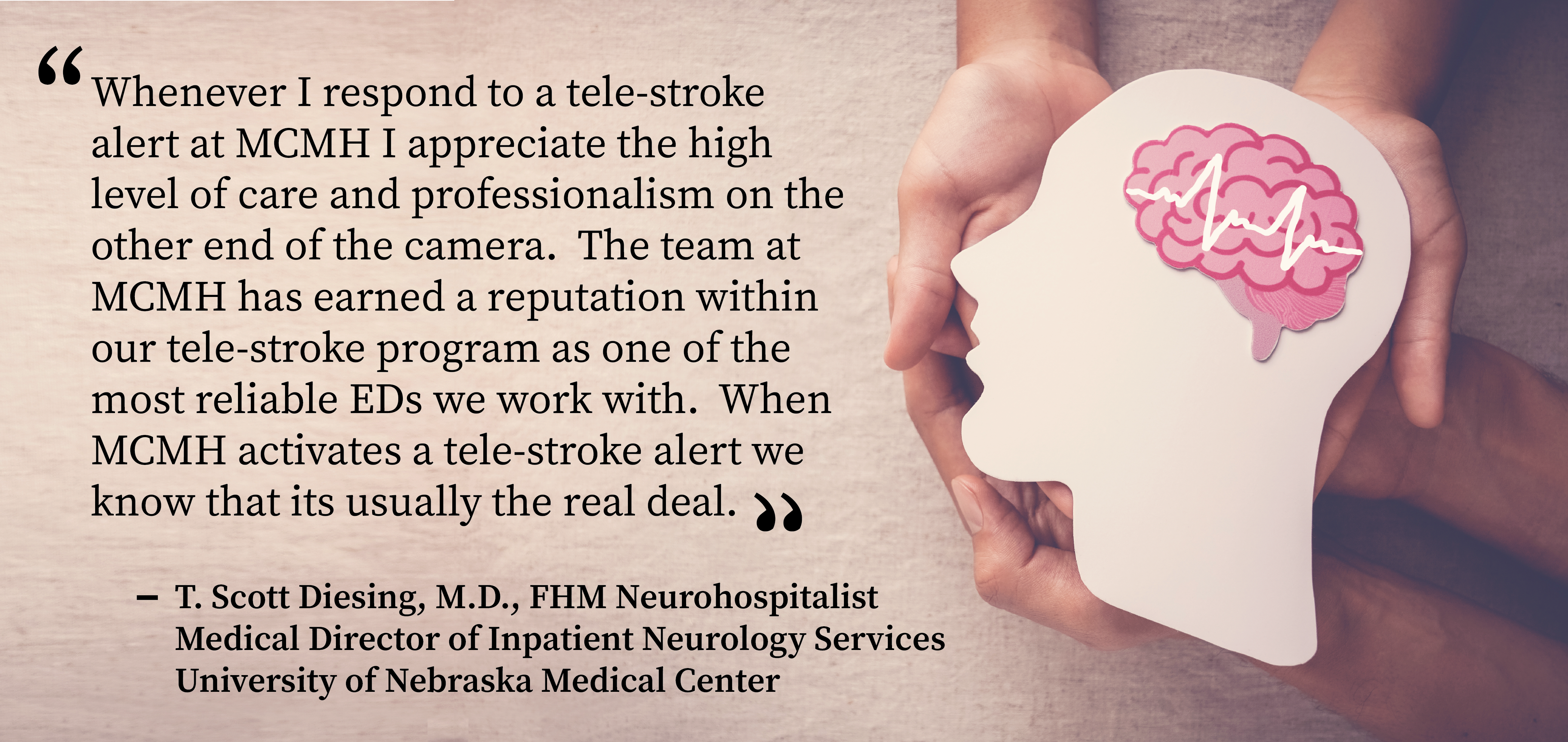A stroke, sometimes referred to as a brain attack, occurs when the blood supply to the brain is blocked by a clot or tear in a blood vessel and poor blood flow to the brain causes cell death. There are two main types of strokes: ischemic, due to lack of blood flow, and hemorrhagic, due to bleeding. Both cause parts of the brain to stop functioning properly. An acute (or rapid) stroke starts suddenly and worsens rapidly. In the United States, about 795,000 people suffer a stroke each year, so it is important to know the risk factors and signs of a stroke.
What are Common Signs of a Stroke?
Stroke symptoms can progress quickly but may wax and wane over the course of a few hours. It is not possible to predict how severe a stroke will become or how long it will persist. Call 911 right away if you or someone you know has any of these symptoms. The most common symptoms of an acute stroke include:
- Numbness or weakness on one side of the body
- Difficulty speaking or trouble understanding what others are saying
- Trouble seeing or loss of vision
- Loss of balance or coordination
- Difficulty walking or falling
- A sudden, severe headache characterized by a stiff neck, facial pain, pain between the eyes, and vomiting
The acronym BE FAST can help you identify if you or someone else may be having a stroke. If you notice any of these signs, get medical help immediately.

What are Risk Factors for Strokes?
Stroke is also the leading cause of serious long-term disability in the United States. It is important to know the risk factors for strokes and how to best avoid them. Some risk factors are non-modifiable and include family history, race, gender, and prior stroke, TIA or heart attack. Many of the risk factors can be eliminated with lifestyle changes. These risk factors include heart disease, high blood pressure, high cholesterol, smoking, and diabetes. Additional modifiable risk factors for strokes include the following:
- Diet
- Atrial Fibrillation
- Sleep Apnea
- Obesity
- Carotid artery disease
- Inactivity/sedentary lifestyle
- Use of birth control pills or other hormone therapies
- Pregnancy
- Heavy or binge drinking
- Recreational drug use
- Sickle Cell Disease
- Carotid Artery Disease
- Peripheral Artery Disease
What To Expect: Stroke Rehabilitation & Post-Stroke Care
After a stroke, you may need to receive medical treatments or surgery, to stabilize your condition. You may also need to work with a team of medical providers, such as neurologists, physical therapists, occupational therapists, and speech therapists, to rehabilitate your body and improve your mobility. Rehab exercise is one of the most important things to do after a stroke. It helps rewire the brain to reduce stiffness and muscle pain. You may also need therapy and medicine to help with depression or other mental health conditions. Joining a patient support group may help you adjust to life after a stroke.
Learn More About Post Stroke Care

Why choose MCMH + Clinics Advanced Primary Stroke Center?
At MCMH + Clinics offer care and support to our patients close to home, without the need to travel far from family and community. Located in a rural community, we are able to provide immediate medical attention to patients from diagnosis and treatment to rehabilitation and recovery. If you or a loved one suffers a stroke, you need fast and expert care close to home. That’s why you should choose MCMH + Clinics, the first certified Advanced Primary Stroke Center in Iowa, with access to Tele-Stroke technology and a team of skilled professionals.
- Our commitment to evidence-based, state-of-the-art stroke diagnosis, treatment, and stroke rehabilitation is reflected in MCMH’s interdisciplinary Stroke Program.
- As an Advanced Primary Stroke Center, we can administer Alteplase. Alteplase injections are used to dissolve blood clots that have formed in the blood vessels.
- We provide care for all types of acute stroke, including ischemic stroke, hemorrhagic stroke, and transient ischemic attack (TIA) patients.
- Our team collaborates with local and surrounding EMS and the community to increase stroke awareness, improve identification, and enhance emergency response.
- We strive to offer individualized care and education for patients and families, while also providing community education programs.
- MCMH + Clinics is proud to be the only critical access hospital in our region offering CT perfusion as a diagnostic tool for acute ischemic stroke diagnosis.
- We have a Telestroke Program which allows for rapid diagnosis and appropriate treatment from a stroke specialist regardless of their geographical location.
Learn More About Our Telestroke Program
Learn more about MCMH's partnership with Nebraska Medicine
Committed to Compassionate Stroke & Post-Stroke Care, Trust the MCMH Stroke Center in Red Oak, Iowa
We are proud to be the only critical access hospital in our area offering CT perfusion as a diagnostic tool in acute ischemic stroke diagnosis.
The MCMH Advanced Primary Stroke Center's mission is to improve community health with dignity, compassion, and respect for every person, every time. Our compassionate and experienced staff focuses on providing comprehensive care for both inpatients and outpatients in our service region from our stroke center in Red Oak, Iowa.
Call 712.623.7000 today or explore our providers and services below.